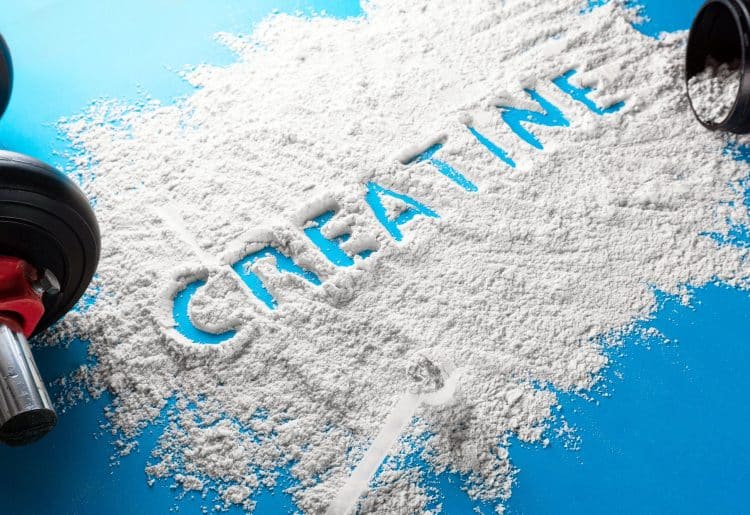Creatine generally does not cause constipation when taken at recommended doses (3–5 grams). However, some individuals may experience temporary digestive discomfort during the initial ‘loading’ phase. (1)
Getting expert insights on this often-debated topic can help you achieve your fitness goals without incurring any digestive discomfort. Creatine supplementation is popular among fitness enthusiasts for boosting workout performance and muscle strength.
As a nutritionist, I get many queries on workout supplements. With so many sports nutrition supplements on the market, it is no surprise that people are apprehensive about creatine.
Before we dive into the constipation question, let’s get a quick primer on creatine.
What is Creatine?
Creatine and protein are both needed for muscle functions and performance. Creatine is a nitrogenous organic compound that is synthesized within the human body. It occurs naturally in certain foods, including fish and meat.
Creatine is not classified as a nutrient, nor is it an amino acid or a protein. However, it is synthesized from the three amino acids — arginine, glycine, and methionine. For the same reason, it is grouped with amino acids due to its structural composition and role in protein metabolism.
Creatine and Constipation
Creatine supplementation increases intracellular water retention, enhancing muscle hydration and promoting muscle growth and strength. However, when more water is retained in the muscles, other tissues may end up with less water.
Low water intake may lead to dehydration in other tissues, including the digestive tract. Dehydration can aggravate constipation as stools’ volume and moisture content reduce, making them harder to pass (2).
Different brands use added ingredients to boost creatine’s effectiveness and flavor. They may contain additives such as fillers, binders, coloring, or flavoring agents, which might cause digestive discomfort or constipation. (3)
If you are considering supplementing with creatine, it is always good to clear confusion and make an informed choice. If you are still concerned about the constipation associated with creatine usage, let’s examine what user experiences and scientific research say on the matter.
Individual differences and tolerance:
People tend to react differently to creatine supplements. Some people reported having constipation in the initial phase of using creatine, while many others had no such issues.
This displays the differences in how creatine intake affects digestive functions. You need to monitor your own responses carefully and adjust supplementation accordingly.
Always consult a healthcare professional before starting supplementation if you have any underlying digestive concerns. Pre-existing digestive conditions, such as irritable bowel syndrome (IBS) or inflammatory bowel disease (IBD), can make you more sensitive to creatine supplements.
Study reports:
- Despite the user experience reports linking creatine to constipation, there is little scientific evidence supporting this association.
- Studies investigating the effects of creatine supplementation on digestion show mixed results. Many studies report no significant impact on digestive health.
- Systematic reviews and meta-analyses examining the safety profile of creatine report it to be well-tolerated when used within recommended dosages (4).
- Rather than constipation, diarrhea seems to be a more common side effect, especially if you take more than 10 grams of creatine in a single serving (5).
Expert Perspectives on “Does Creatine Cause Constipation?”
Now, let’s look at what the experts say on this topic.
Dietitians and nutritionists
Nutrition experts recommend a balanced diet rich in fiber and fluids to promote overall digestive health. A balanced diet is essential for regulating bowel movements and preventing constipation. This supports your digestive health and helps mitigate the potential side effects associated with creatine supplementation:
- Include a variety of nutrient-dense foods that offer essential vitamins, minerals, fiber, and antioxidants.
- Limit your intake of highly processed and refined products.
- Prioritize whole, unprocessed foods.
Nutritionists also highlight the importance of adequate hydration while taking creatine to ensure proper bowel movements and prevent constipation.
Dr. Eric Berg, a well-known keto diet specialist, says:
“Creatine can help increase muscle size without any unnatural substances. Here’s where science kicks in: water molecules are drawn towards cells filled with creatine, which results in cell volumization, making your muscles appear more prominent than before.”
He also points out:
“While it’s true that creatine draws water into your muscles — a plus for muscle growth — there isn’t any solid proof that it causes dehydration.”
You must avoid dehydration whether you’re taking creatine or not. Observe your urine color to monitor your hydration levels. A pale yellow urine signals proper hydration. If your urine is consistently darker, this could indicate a need to increase water intake.
Sports medicine professionals
You may notice a sudden spike in your body weight when you start taking creatine. Your weight may increase by about half a kilogram to 2 kilograms. But don’t worry, this is just water weight, as creatine pulls water into your muscle cells.
According to sports medicine specialists, gym-goers and athletes taking creatine supplements must consume additional water before, during, and after a workout to compensate for fluid loss and support their muscles’ increased metabolic demands.
Besides watching your hydration levels, they also emphasize the importance of starting with a low creatine dosage and gradually increasing your intake. You need to monitor for any adverse effects and adjust your dosage accordingly.
Hydration is not just about preventing constipation. Dr. James Anderson, a sports medicine specialist, clarifies:
“Creatine requires a sufficient water supply to function optimally. Without enough water, the effectiveness of creatine diminishes. There’s also an increased risk of muscle cramps and discomfort, which hinders athletic performance and overall health.”
How To Minimize Constipation and Other Creatine Side Effects
If you are considering starting creatine supplementation, consider these tips to minimize the side effects and maximize the benefits. This action-oriented section expands on many of the experts’ suggestions.
1. Stay hydrated
As highlighted throughout this article, the first and foremost tip is to drink as much water as possible — about eight to 12 glasses daily. Keep yourself well hydrated by including fluids in your diet, such as soup, lemonade, smoothies, and so on.
Increase your water intake before and after strenuous physical activity. Drink more water in warm weather.
2. Gradually increase the dosage
Another key point is to start with a lower creatine dose. Don’t jumpstart with large doses because you are in a creatine-loading phase. Gradually increasing the dosage allows your body to adapt to the supplement.
Observe how your body responds and slowly increase the dosage according to your tolerance levels. This minimizes the likelihood of constipation and other gastrointestinal discomfort.
3. Take with meals
Some people take creatine supplements on an empty stomach and experience no side effects. Many others report taking creatine with meals to help reduce digestive discomfort.
Taking creatine with your food may help buffer its effects on the digestive system, thus reducing the chances of digestive issues. You can make a nutritious and hydrating pre-workout smoothie with 3-5 grams of creatine and a combination of ingredients such as yogurt, almond milk, peanut butter, bananas, spinach, chia seeds, and so on
4. Consider the timing
Pay attention to how your body responds when taking creatine at different times of the day. Adjust the intake timing to improve tolerance and maximize results.
You can take creatine before, with, or after meals and pre and post-training. You can also have it earlier in the day or later in the afternoon. You have to find out what timing works best for you.
5. Incorporate fiber-rich foods
A fiber-rich diet can help regulate bowel movements and relieve constipation. So, add plenty of high-fiber foods to your diet, including whole grains, legumes, fruits, vegetables, nuts, and seeds.
Then again, suddenly ramping up your fiber intake, especially without adequate hydration, may lead to bloating and more digestive complaints. So be gradual with this process, too.
6. Monitor your symptoms
You may need to adjust your dosage, timing, or cycle to prevent gastrointestinal discomforts such as bloating, cramping, or constipation. So, pay more attention to how your body responds to creatine.
You can use a journal to track your symptoms. Note any patterns or changes over time to optimize the supplement’s effectiveness and rescue its side effects.
7. Monitoring electrolyte balance
If you have been experiencing constipation after taking creatine, this may be due to electrolyte imbalances in your body. Creatine supplementation can affect electrolyte levels in your body, particularly sodium and potassium. Such imbalances can lead to gastrointestinal issues.
Adding more electrolyte-rich foods to your diet may help resolve your constipation woes. For example, bananas offer potassium, while spinach contains magnesium. You can get calcium from yogurt. The easiest way out is to get some electrolyte supplements or sports drinks to help you maintain the required electrolyte balance.
8. Consider alternative forms
If your digestive issues continue despite following these tips, consider exploring alternative types of creatine, including creatine monohydrate, creatine hydrochloride (HCl), and buffered creatine.
Creatine monohydrate is the most popular form. It is favored for its effectiveness and affordability. It is available in powder form, making mixing with water or juice easy.
Creatine hydrochloride or buffered creatine may offer advantages such as improved solubility or reduced bloating. These forms may also be easier on your digestive system. However, they are not as extensively researched or widely adopted as creatine monohydrate.
Conclusion
There is not enough scientific evidence to say for sure that creatine causes constipation. There are some anecdotal reports and individual experiences that have raised concerns about creatine causing constipation. However, most people do just fine while taking creatine.
Ultimately, it’s more about your personal needs and tolerance levels. By using expert insights and an evidence-based approach, you can prioritize your digestive health and make informed decisions about your creatine supplementation. If you are prone to digestive complaints, it’s always best to get personalized guidance from your healthcare provider.
References:
- Groeneveld, G. J. et al. (2004). “Few adverse effects of long-term creatine supplementation in a placebo-controlled trial.” International Journal of Sports Medicine, 26(4), 307-313.
- Arnaud, M. J. (2003). “Mild dehydration: a risk factor of constipation?” European Journal of Clinical Nutrition, 57(Suppl 2), S88-S95.
- Bizzarini, E., & De Angelis, L. (2004). “Is the use of oral creatine supplementation safe?” Journal of Sports Medicine and Physical Fitness, 44(4), 411-416.
- Kreider, R. B., et al. (2017). “International Society of Sports Nutrition position stand: safety and efficacy of creatine supplementation in exercise, sport, and medicine.” Journal of the International Society of Sports Nutrition, 14: 18.
- Ostojic, S., & Ahmetović, Z. (2008). “Gastrointestinal Distress After Creatine Supplementation in Athletes: Are Side Effects Dose Dependent?” Research in Sports Medicine: An International Journal, 16(1), 15-22
Tip: If you're signed in to Google, tap Follow.











